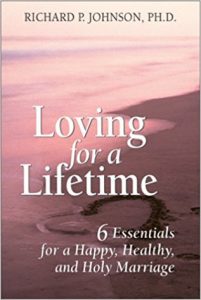Loving for a Lifetime: 6 Essentials for a Happy, Healthy, and Holy Marriage
 In the past century, life expectancy has increased by 30 years. Richard Johnson believes God has given human beings an additional three decades so that they can draw upon the wisdom of the mature years, an age when spiritual growth can flourish.
In the past century, life expectancy has increased by 30 years. Richard Johnson believes God has given human beings an additional three decades so that they can draw upon the wisdom of the mature years, an age when spiritual growth can flourish.
In this book Johnson addresses mature marriages — those past the 25th anniversary and those entered into by mature individuals — and shows couples how to use personal gifts to enhance individual and marital happiness, and spiritual well-being. He brings to this book academic studies and research, counseling experience and lengthy experience in adult ministry, as well as personal learning in his own maturing marriage.
Johnson posits that in the first stages of marriage a couple needs to work on basic competencies of togetherness, respect, communication, intimacy, trust and commitment. Each partner brings personal gifts that enhance those marital essentials. A goal of the partners is to help one another express their gifts for the good of the individuals and to build a happy, healthy, productive marriage.
Yet individuals also come into marriage with “shadows” and “compulsions” that can block each other’s gifts and undermine or damage the relationship. If instead of centering their marriage in their six essentials the partners balance one another out of shadows and compulsions, they erode or evaporate their marriage.
In the absence of an essential virtue, because personal gifts are shadowed or blocked, the relationship erodes. Perversion or overinflation of gifts dissipates marital health as if by evaporation.
As a couple matures in marriage they have the opportunity to advance to a new level of loving by addressing the spiritual aspects of the six marital essentials or virtues. Johnson’s terms for those spiritual conditions are “sacred unity,” “spiritual faithfulness,” “transcendent prayerfulness,” “holy groundedness,” “redeeming forgiveness” and “blessed uniqueness.”
Spouses committed to mutual salvation can progress in their vocation by centering themselves in their personal gifts, which the book helps them recognize. As each current gift is identified — God invests different graces in a person at different times of his or her life — related shadows and compulsions also are revealed. Knowing one’s current spiritual strengths and consciously avoiding blind spots and the false self enables a person to be a better spouse and to contribute more to the marriage’s unique beauty.
Anecdotes help to illustrate how couples use their gifts for mutual benefit or get into trouble via shadows and compulsions, reacting to one another in unhealthy ways. When both partners live out of their gifts, God’s power works most effectively in and through their marriage.
Identifying one’s gifts is not always easy, and Johnson suggests using an online profile that has been renamed since he wrote the book. Now called the “Spiritual Strengths Finder,” it can be accessed at www.healyourillness.com for a nominal fee.
Some concepts do not become fully clear in the brief span of the small book, although there is a lot packed between its covers. This is a book for thinking couples, yet its basic ideas are accessible to anyone. A solid amalgamation of spiritual development and marital enrichment, this is a welcome resource for couples beyond mid-life, for whom many marriage books are too elementary.
About the reviewer
Mary Ann Paulukonis is an artist, writer and consultant for marriage and family ministry.
Disclaimer: Book reviews do not imply and are not to be used as official endorsement by the USCCB of the work or those associated with the work. Book reviews are solely intended as a resource regarding publications that might be of interest to For Your Marriage visitors.




